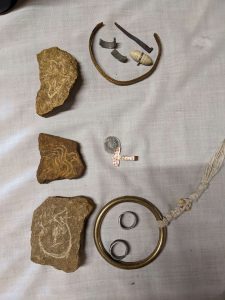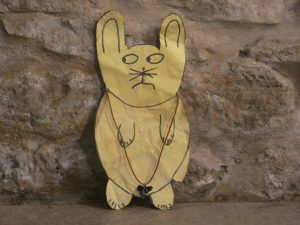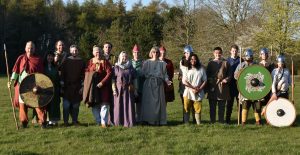In the autumn of 884 we returned to the borders of Mercia and Wessex, as several small groups of Vikings passed through the area trying not to get into too much trouble. Ingibjorg Ragnarsdottir, travelling with her cousin Finn Jonnsunr of the Holmbyggjar, gave this account of their journey. Note that these events take place before Ingibjorg and Finn settled with Ulrik.
I am Ingibjorg, daughter of Ragnar and widow of Halldor. We lost our farm near Fyrnat in Jutland when my father was killed in a feud over pasturelands. I took counsel with my cousin Finn Jonsunnr and he bethought me of our uncle Ulrik, who has been campaigning in the lands of the Angles since the time of the Great Army under Guthrum. Ulrik plans to take land there. So we took passage across the North Sea and set out to find Ulrik and ask to join him in his new settlement.
It will not surprise you that finding the correct army of Vikings has not been easy! However the journey is interesting, and while we have been greeted with hostility in many places, it is no worse than the endless conflict with our former neighbours. We have not yet found Ulrik, and another matter has been troubling me.
When I left Jutland, my aunt Ingibjorg, for whom I was named, and who took care of me after my mother’s death, asked me to aid her. Many years ago, my aunt was secretly courting a young man named Ketil. His father wished him to marry a wealthy but much older widow in a nearby settlement, and his plan was to go viking and win enough wealth that he could marry who he wished – but in the meantime, Ketil wanted to avoid falling out with his father. At least, that’s what he said…but one day, my aunt found that a fine pair of socks she had needle-bound was missing. These socks were new, and warm, and winter was coming on, and she was sure that she’d left them safe in the clothes-box. But they were gone…and a few days later, Ingibjorg found out where! Another young woman in the area, Inga, was wearing them!
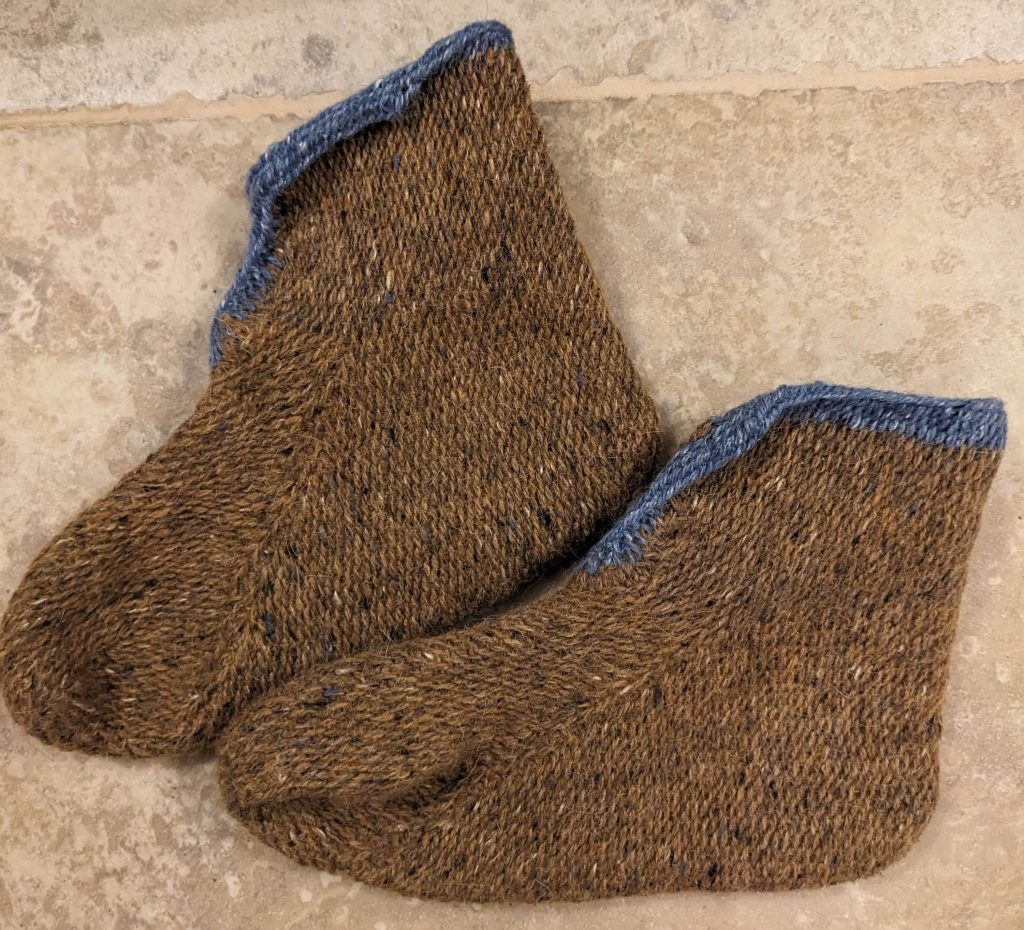
Ingibjorg followed Inga discretely and saw her meet with Ketil, who told her exactly the same story about a secret betrothal. Inga had the nerve to thank Ketil for the socks and laugh at his claim that he had made them himself! Inga was a strong woman, a good hunter and could sing like a lark. But Ingibjorg was furious and went to the local seiðr-woman for vengeance. The seiðr-woman gave her a strong curse which struck Inga down with a fever.
For a while, Ingibjorg was very pleased with herself. But Inga grew sicker and Ketil lost interest in her, and did indeed go off viking. Inga lay ill and alone and my grandmother Gunni asked Ingibjorg to take her food and medicine. Ingibjorg didn’t want to go! But she wouldn’t disobey her mother, so she packed up herbs and food and tramped off to Inga’s little house on the edge of the woods. Seeing Inga so ill melted her heart, and she realised she didn’t want to cause Inga’s death, but the curse was too strong and the fever was tearing Inga apart. Ingibjorg asked the seiðr-woman for help, and was told that the curse could not be broken but it could be transferred to the socks. Ingibjorg bathed Inga’s forehead in spring water with one sock each evening, and with dew on other sock in the morning, for seven nights. The evil spirit departed from Inga, and she and Ingibjorg became very good friends and saw no need to trouble themselves with men like Ketil. Indeed after my marriage, Ingibjorg moved to the house by the woods and the two good friends live together still. Ketil returned from viking with a few silver coins and a scar on his leg, and married the widow.
But Ingibjorg could not forget the cursed socks. The seiðr-woman told her that anyone who wore them would be struck down, and if the socks were burned then the curse would return to Inga. So Ingibjorg asked me, her namesake, to take the socks and try to find someone who knew how the curse might be lifted and the evil banished.
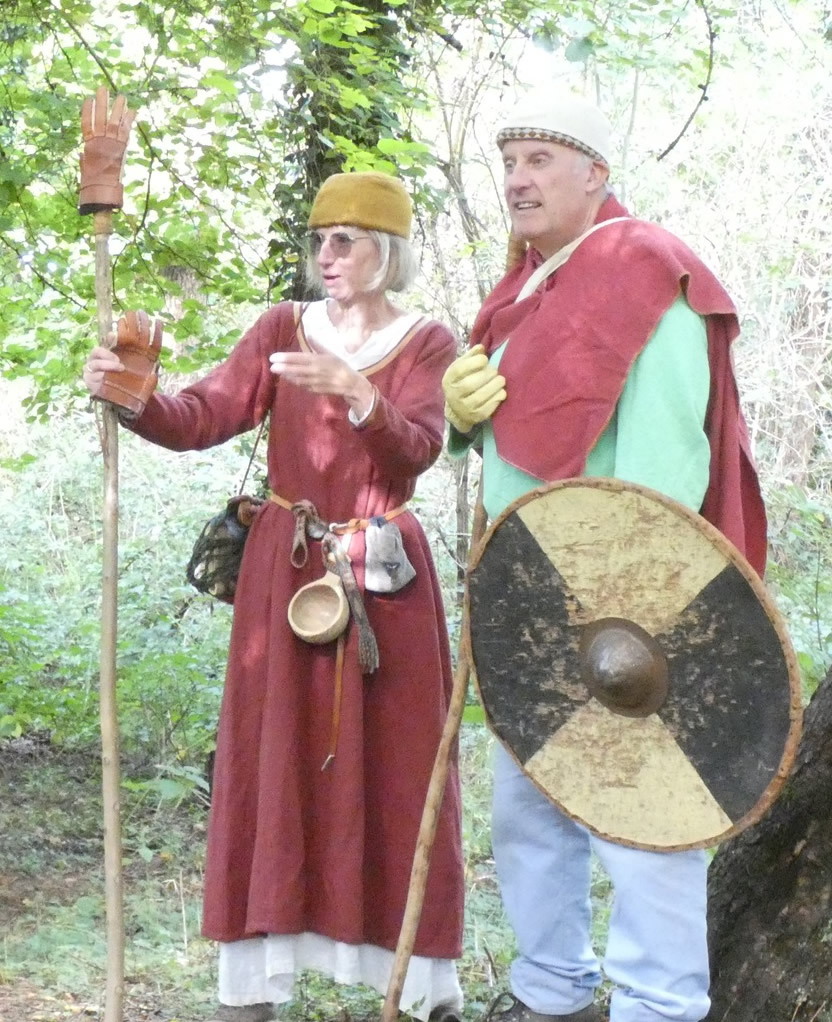
Well, that’s how I came to be walking with cousin Finn through the woods on an autumn day somewhere in the kingdom called Mercia. We had passed by a village but I glimpsed a figure in a black robe and I have learned that these garments are worn by Christian monks who are always hostile to those of us who still respect the old ways. So we slipped past the village, only to encounter a couple of armed Danes on the track!
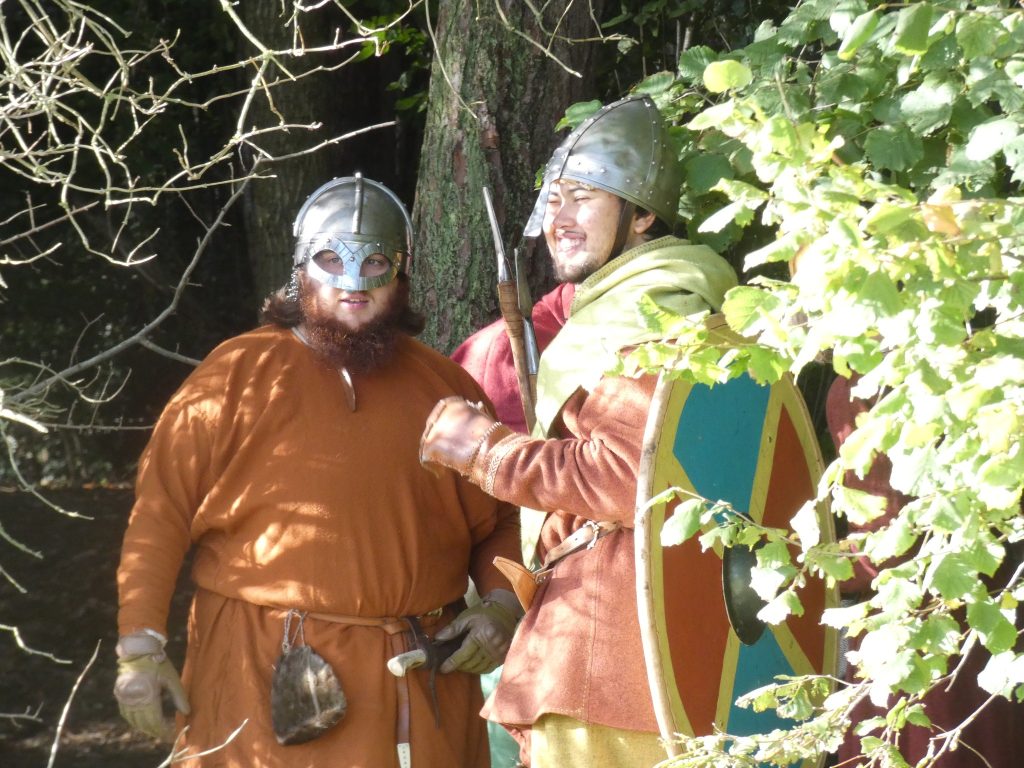
And I recognised one of them! It was Hjalmar, who I met at the wedding of my half brother Hauk some years ago. He’s a likeable fellow though like most of Hauk’s crew he’s not the sharpest arrow in the quiver. Still, it was pleasant to see a familiar face. His companion was Signy, and it was not clear why they were neither with Hauk nor on his ship? The last message I heard from Hauk was that he’d taken land up near Jorvik and was getting rather more settled, letting his second in command take the ship out raiding. Hjalmar said they were looking for Hauk and on hearing my tale said that they would accompany us as we travelled northwards looking for Ulrik and whichever remnant of the Great Army he’d settled with.
I mentioned my aunt’s request and Hjalmar said that various hermits lived in these woods, including the monk I’d seen earlier and a seiðr-woman (who Signy seemed to owe a lot of money).
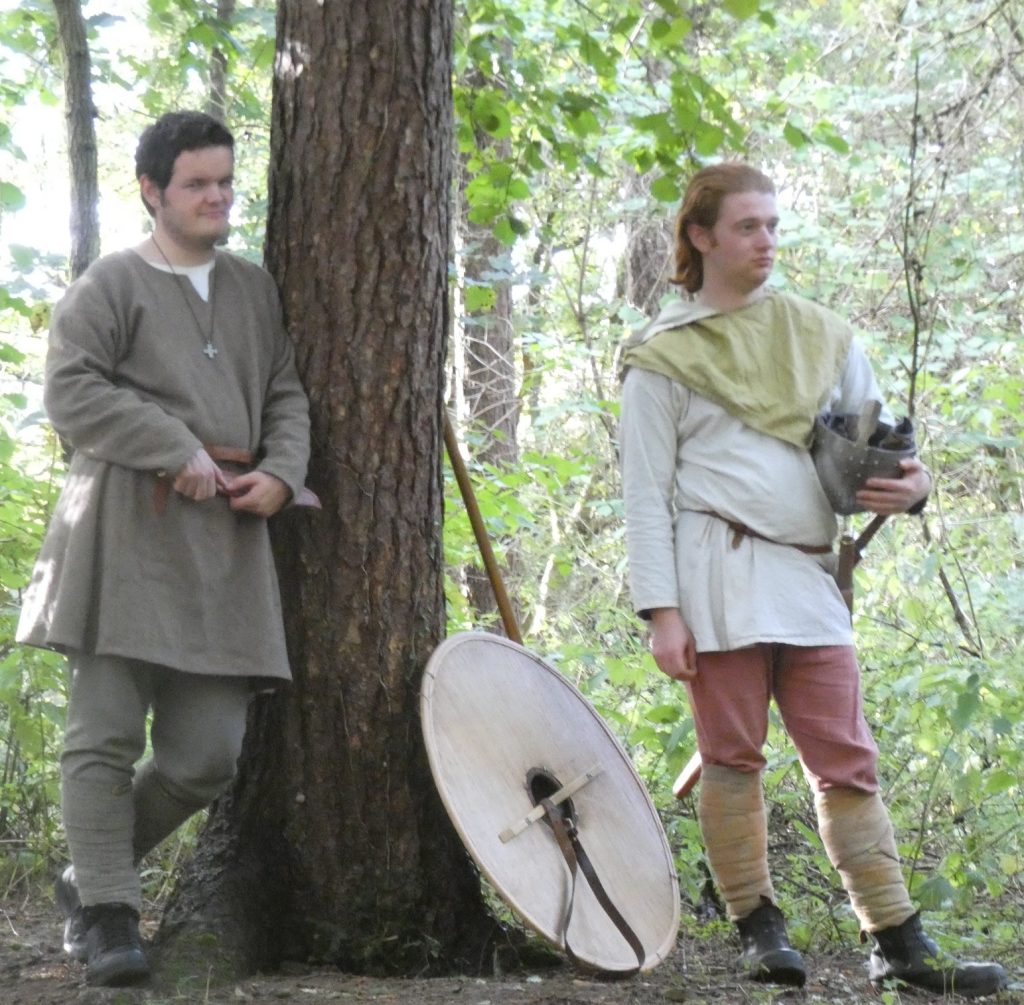
Then we realised that two Saxon men were sneaking around and following us! They seemed to know Hjalmar and Signy and couldn’t be persuaded to leave us alone. It was all very odd. Eventually we managed to shake them off. Signy led us to the little hut where the wise woman lives, and she told me that yes, she could tell me how to break the curse but she wanted payment of three chickens. That was a fair price but I had not brought chickens with me from Jutland! However, perhaps I might be able to trade with the villagers? I still have a few small pieces of jewellery with me.
As we were walking away from the hut, Signy got tangled up in his shield-strap and fell over. Then those two Saxons ran up and one of them stabbed Signy! Signy managed to stab him back and they ran off. The wise woman, Ástriðr, offered to heal him in return for a silver coin and I began to see how the accident-prone Signy had run up such a debt. And to suspect that he and Hjalmar had been hanging around the village for quite a long time. But I had with me a healing charm that my aunt gave me and was able to cure his wound.
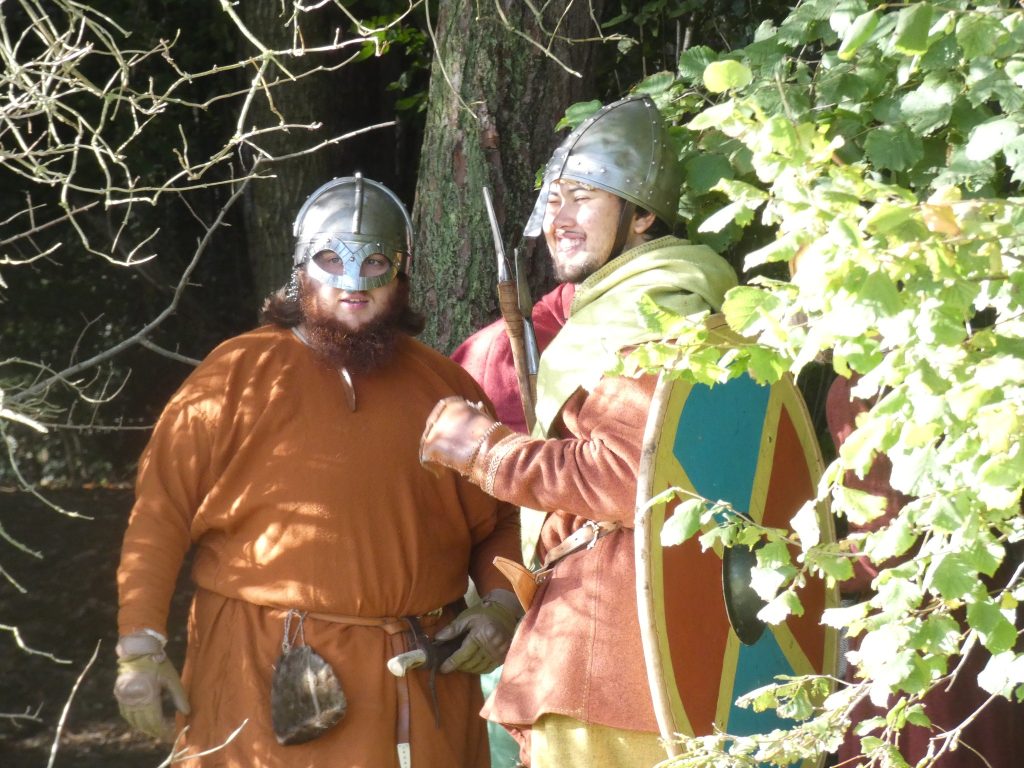
Once we approached the village, we stopped to discuss the best approach. While Signy tried to untangle his I-go-both-ways Thor’s hammer-cum-cross necklace from his helmet, I wondered which brooch to offer in trade. But I wasn’t very keen to give any nice things to the village after one of them stabbed Signy! Even if he is a bit annoying.
Then I had an idea…if I gave the socks to the Saxon, as a peace offering, then he’d get sick and he could pay Ástriðr directly for healing. It would be a fair punishment and he’d recover eventually, so I was sure my aunt would be happy with this.
On our way, Ástriðr picked up a limb of a tree and made cousin Finn carry it. Apparently it was very important though it just looked like an old stick to me and I didn’t know why she made a fuss just because a bit snapped off when he waved it as Signy.
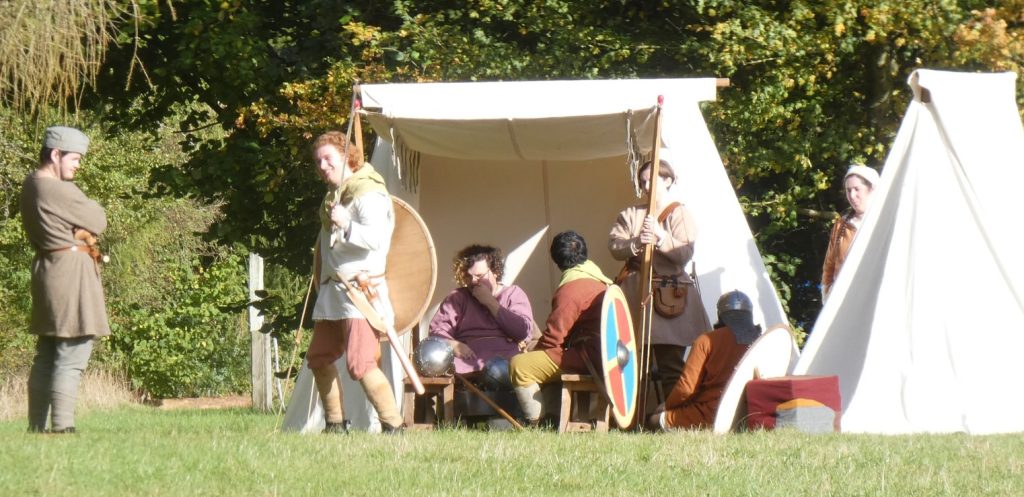
So we approached the village, and they were of course extremely suspicious of us. The Saxon man, I learned his name was Oswyn, was moaning about having been stabbed even though it was entirely his own fault. I offered him the socks as an apology and we had a rather tense negotiation. I admit that I was grateful to Signy for assuring Oswyn that we intended no harm, thus saving me from telling a falsehood, and eventually Oswyn accepted the socks and we scurried away. I was happy enough not to have to give up my nice bar brooch.

Let me see, what else was going on. That monk guy was hanging around in the village, and he was complaning bitterly that Ástriðr had taken all the berries and mushrooms for miles around – and had summoned bears. This was daft as she’d made the exact same complaint about him! It was clear that they were blaming each other for everything that went wrong. There was also some talk of a dead religious leader but I forget who. Anyway, Ástriðr got really fed up and planted a curse pole – that’s what the stick was for – in the village. She told me afterwards that Oswyn went up to it and read the runes which cursed him that no man would believe him. Indeed it was a powerful curse, because although over the next day or two he did indeed fall into a fever, all his friends thought he was shamming and paid him no attention! (Or maybe they didn’t like him anyway)
Once he was really sick, I went to the village and explained that he could only be cured by paying Ástriðr four chickens (I like chicken soup). I think the monk had tried to lift the curse but of course he failed. No-one took me seriously and in the end we decided we’d have to go on our way.
We travelled north and shortly came to an old mound in the woods, it must have been a burial place and I felt a chill around me, but it was a good sheltered spot to rest. While we were sharing a meager lunch, Oswyn appeared! He was half dead and raving with fever, we fought him off but clearly he was a menace to everyone for as long as he lived and I didn’t like to think what would happen if he bit someone. We returned to that perishing village and warned the villagers that their friend was running around attacking people and they needed to catch him and get the wise woman to lift his curse. We chased Oswyn around the woods and he attacked several people before finally being cornered and brought down.
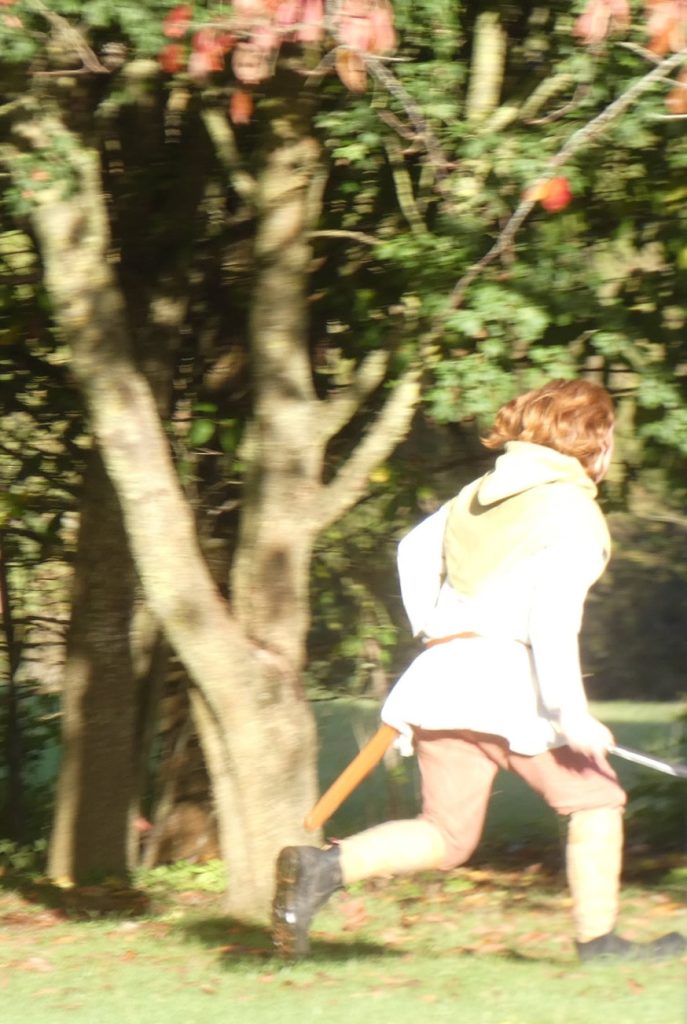
At last Ástriðr was offered her price and cured Oswyn of his fever, returning the socks to me. Unfortunately part of the cure is to bathe the socks in cow vomit which is very traditional but pretty icky, and it was very nice of one of the villagers to let me use her cow for the purpose.
Finally, Ástriðr told me how to break the curse which is that I must don the socks, inside out and unwashed ick ick ick, and walk three times backwards, widdershins, around a bog chanting a prayer to Odin and the other gods:
Forfeður líta á mig
Óðinn verndaðu mig
Freyja læknar mig
(Ancestors look upon me
Odin ward me
Freya heal me)
Then at last I can wash the dratted things and know that I have fulfilled my promise to my aunt and can focus on finding Ulrik.
Finn was very patient with all this running around!
The only remaining incident was at supper, when Signy ran in shouting that he’d seen the comet! But it was a cloud.
